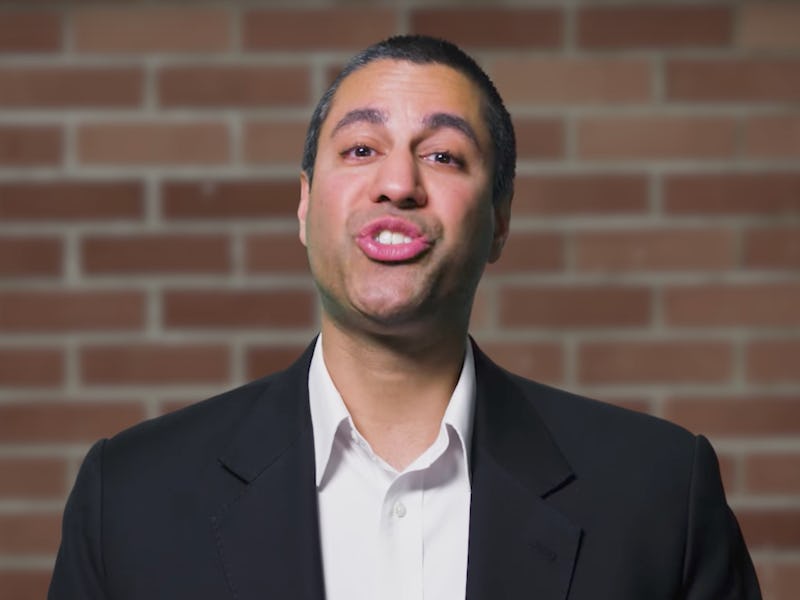How Net Neutrality Can Come Back from the Dead
Ajit Pai is going to win this battle, but hopefully not the war.

Net neutrality is going to end. Despite 2.6 million public comments, a fiery dissent from the FCC’s only Democrat, and guerrilla online activism, Republican Chairman Ajit Pai has the votes (all two of them) and the FCC is going to vote to remove Title II from internet service providers, giving them unprecedented control over how their customers use the internet.
On Tuesday, the FCC released WC docket 17-108, a notice of proposed rulemaking that would, among other things, officially lift the Title II regulation governing telecommunications companies from ISPs, reversing the same commission’s 2015 decision. While Title II isn’t a perfect fit for regulating the new public utility of the internet, its regulation widely prevented telecom companies from strong arming their customers with inescapable monopolies, throttled streaming speeds, or just outright censorship. But unless the American government completely devolves into corporate-controlled feudalism, there are a few ways that, eventually, it could come back — and that means the fight has to go on.
Weird, this guy who wants to end net neutrality also used to work for Verizon, a company that stands to gain a lot from killing net neutrality protections.
See You in Court
If the FCC’s new rules do pass, as they almost certainly will, there’s still a way to fight. In the interim, net neutrality will end, and the telecommunications companies that fund super PACs that help elect Republican members of Congress will undoubtedly find new and horrifying ways to make money from it — briefly.
“It’s much easier to say you’re going to get rid of net neutrality than to actually do it,” Craig Aaron, the president and CEO of advocacy group Free Press tells Inverse. “They have to make a legal case for it. If Ajit Pai continues down this road, and they will, then we’ll sue them. There’re no guarantees in court, but we think we have a pretty good chance.”
Net neutrality has a good record in Federal courts — when ISPs sued to get it overturned in 2014, two different courts upheld the Obama-era FCC’s ruling.
“The courts have been very clear that Title II is the only legally sound way to enforce bright line rules against blocking, throttling, and paid prioritization,” Evan Greer, the campaign director at Fight for the Future tells Inverse. “The current FCC knows this, but is moving forward with their plan at the behest of the cable companies. Legally speaking, they shouldn’t be able to undo the current rules without showing evidence that the rules are harmful to consumers.”
Apple dude Steve Wozniak was stoked the last time the FCC passed Net Neutrality.
Empty Slots on the FCC
The FCC is a five-member commission, where commissioners serve five-year terms. Right now, there are only three commissioners: Pai, a Republican elevated to the top spot by President Donald Trump; Michael O’Rielly, a Republican from New York; and Mignon Clyburn, a Democrat from South Carolina.
Here’s how the empty slots on the FCC are filled: the President gets to nominate FCC commissioners (and designate the chairman), but they have to pass confirmation by the Senate. Additionally, there can only be 3 FCC Commissioners belonging to one of the two major parties at one time — so with a full house, convincing even one of the commissioners to vote against their party can have a huge swing. Trump can nominate one more Republican to the commission, but then will have to nominate a Democrat as well.
Net neutrality has become a deeply partisan issue, with the GOP campaigning heavily against it — in the name of free enterprise — and Democrats generally supporting it — in the name of consumer choice — so for the time being, you can expect votes to go down party lines. A party line vote doesn’t look good, either. Pollsters think it’s a longshot that Democrats take back the Senate in 2018, meaning confirmation of FCC commissioners is going to be a breeze for the Republicans. If Trump is not re-elected in 2020, the equation changes, although if the GOP retains the executive branch it’ll be much more difficult to create a lasting policy of net neutrality.
Why There’s Still Hope for Net Neutrality
There’s no two ways around it: things look very, very bad for net neutrality. But Greer said she and other open internet advocates aren’t giving up.
“We are certainly up against long odds, and this FCC leadership is barely trying to hide the fact that they are working in the interest of Comcast and Verizon and not the public, but that is not new,” Greer says. “The internet has changed the rules for what is and isn’t possible in Washington, DC and it’s precisely that transformative power that we are trying to defend.”
The most important thing, Greer says, is to counter misinformation, and consistently badger Republican representatives. The American public, in general, strongly supports most aspects of net neutrality, across party lines, so Republican representatives who vote against it are also voting against their constituencies.
“The Trump administration has grossly misjudged where their base is on this issue,” Greer says. “We need to make sure the FCC gets that message before it’s too late.”
To make your voice heard, visit the FCC proposal’s site and leave a public comment.